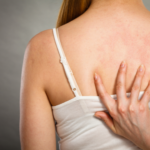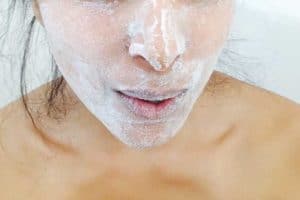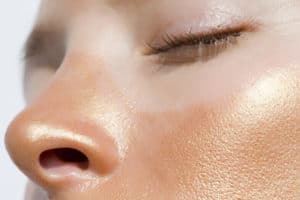Itchy mosquito bites are frustrating; however, you can do some simple home remedies to minimize the irritation and heal it faster. You can do a hot spoon mosquito bite treatment to relieve itchiness.
A hot spoon mosquito bite treatment involves heating a metal spoon under hot tap water for a few minutes and pressing the spoon directly against the mosquito bite for two to five minutes. The itch should be gone afterward.
When a mosquito bites your skin using its proboscis (mouthpart) to suck blood, it leaves saliva on your skin. This saliva interacts with your body, and itching or bumps occur. Some people react mildly, while others may develop more severe reactions, such as soreness, swelling, and redness.
So, the reason for the itching is that the mosquito bite leaves a protein under your skin when it bites you, causing itchiness and sometimes preventing blood clotting. [1]
Read on to learn more about how a hot spoon can stop the itchiness caused by mosquito bites, other home remedies, and some tips for avoiding mosquito bites.
Hot Spoon Mosquito Bite
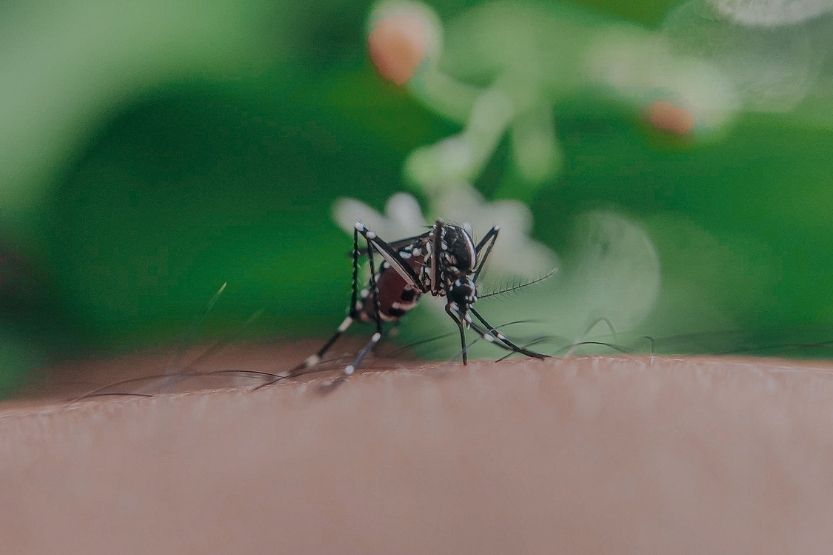
Using a hot spoon mosquito bite treatment is a simple home remedy to relieve the itchiness of the spot.
All you have to do is heat a metal spoon under hot tap water for a few minutes. Apply the hot spoon directly against the mosquito bite for a few minutes. The itch would disappear when the spoon denatures the protein causing the itch in the skin. [2]
Mosquito bites can cause not just itchiness but sometimes life-threatening illnesses, depending on the mosquito type. Often, they act as vectors for the transmission of viral and parasitic diseases.
According to the U.S. Centers for Disease Control and Prevention (CDC), infected mosquitoes could transmit the following diseases:
- Malaria,
- Chikungunya virus,
- Zika virus,
- Dengue, and
- West Nile virus. [3]
Although some may only have a mild reaction to the diseases, many can die of fatal illnesses. So, it would be best if you did not disregard mosquito bites when you are in infested areas.
You can find various mosquito species in different geological areas. Most mosquitoes breed in water and spread the virus via their bites. They act as vectors for the transmission of these diseases when they bite infected persons.
There are opposing views, though, on whether to use hot or cold on mosquito bites. Mayo Clinic recommends the use of a cold pack instead of in treating mosquito bites. [4]
You will have to find out which one works for you best.
Mosquito Species and the Diseases They Cause
- Aedes causes Dengue, Rift valley fever, Chikungunya, Zika, Yellow fever, and Lymphatic filariasis.
- Culex causes lymphatic filariasis, West Nile fever, and Japanese encephalitis.
- Anopheles causes malaria and lymphatic filariasis. [5]
Symptoms of Mosquito Bites
- Reddish bumps
- Itchiness
- Dark spots
- Puffy bumps
- Small blisters
- Hard reddish-brown bumps
Severe Symptoms
- Low-grade fever
- Hives
- Lymph nodes swelling
- A large area of reddish bumps
Complications of Mosquito Bites from Non-Infected Mosquitoes
Mosquito bites can become infected. The symptoms are warm skin area, reddish color, or red streaks. You may not have acquired a mosquito-borne illness, but you could get a microbial infection because of an unattended mosquito bite.
You should see your doctor when these symptoms appear, as the infection may worsen.
Treatment of Mosquito Bites
One of the most common home treatments for itchy skin is a hot spoon on mosquito bites. But serious illnesses often need medical intervention and hospitalization.
Virus conditions are treated with antiviral supportive medications as there are no specific antiviral drugs per se. [5]
Doctors treat malaria with anti-malarial drugs, such as quinine, doxycycline, and chloroquine. They also treat parasitic infections with anti-parasitic medications (for filariasis), like diethylcarbamazine citrate (DEC) and Ivermectin. [6]
You could also do the following steps:
- Wash the spot thoroughly with soap and water.
- Reduce swelling and itchiness by applying an ice pack for 10 minutes.
- Reapply the ice pack as necessary. Be careful not to injure your skin.
- Dissolve one tablespoon of baking soda in enough water and apply this to the itchy area.
- You can also use an antihistamine or anti-itch cream to relieve itching.
Home Treatment for Mosquito Bites
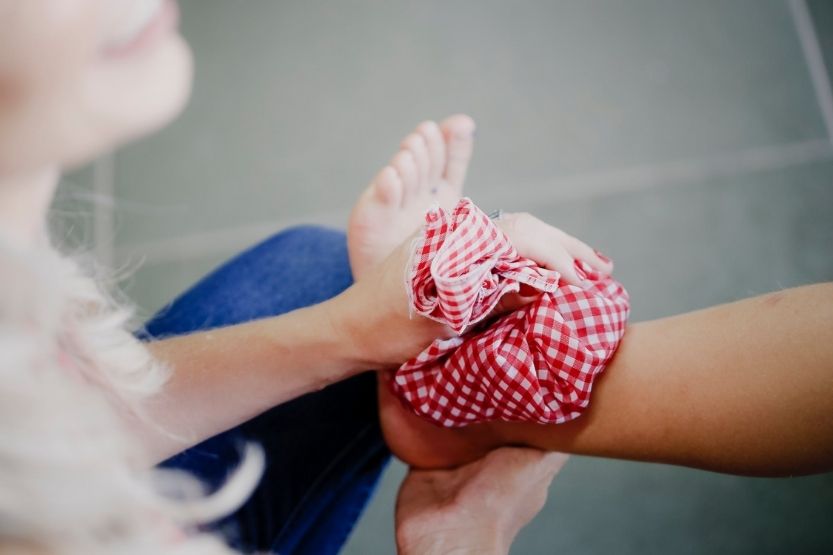
1. Ice Pack
Contrary to the hot spoon on mosquito bite treatment, you can also relieve itching and swelling using an ice pack or an ice bag. Place the ice bag directly over the bumps and move it over the area. Do not allow the ice pack to stay in one spot longer than necessary, as this can damage your skin.
2. Aloe Vera
Aloe vera’s gel can help heal bug bites, minor wounds and reduce inflammations. You can cut a small section of the plant and apply the gel directly to the mosquito bites. Ensure that you have washed the plant before cutting it to prevent contamination. Do this twice or thrice a day. [7]
3. Baking Soda
Prepare the baking soda (sodium bicarbonate) by mixing one tablespoon with sufficient water to make a paste. (You could also follow the steps described previously). Apply the paste directly to the mosquito bites.
4. Onion
Wash the onion thoroughly and then cut it. Apply the juice directly to the bite for a few minutes. Afterward, wash the area well with mild soap and water.
The onion will help reduce itchy skin and swelling. Onions may also have antiseptic properties like many home ingredients.
5. Garlic
Garlic is a well-known remedy for various illnesses like hypertension, heart disease, and throat infections.
Mince the fresh, skinned garlic into fine pieces and mix it with coconut oil. Apply this preparation directly into the mosquito bites for 10 minutes.
Wipe off the preparation with a cool and clean washcloth. Reapply if itching persists.
6. Vinegar
Apple cider vinegar is used as a natural remedy for many conditions, including itchy mosquito bites. [8]
Place a drop of vinegar directly into the skin area to reduce itching and burning sensations. Vinegar can also serve as an antiseptic to cleanse the area.
If you have numerous bites, you can prepare a vinegar solution by mixing two cups of vinegar with ample tepid water. Soak the bitten area for at least 20 minutes.
7. Honey
Honey has antibacterial and anti-inflammatory properties, so it is an ideal home remedy for many conditions.
Place a drop of honey on the bite to reduce itching and inflammation. The honey could also help reduce your risk of infection due to its antibacterial property.
8. Oatmeal
Oatmeal can relieve swelling and itching due to its anti-irritant properties. [9] Prepare the oatmeal paste by mixing equal amounts of water and oatmeal. Apply the mixture to the skin area for 10 minutes.
If you have several bites, you can prepare an oatmeal bath by mixing one cup of oatmeal with warm water in your bathtub. Soak the affected skin area for 20 minutes. You can enjoy an oatmeal bath as well while gently scrubbing the mosquito bites.
9. Basil
Basil is not only a great ingredient, but it is also an excellent mosquito-bite remedy. Basil’s eugenol component could relieve itchy skin. [10]
Prepare the basil mixture by adding ½ ounce of dried basil leaves to two cups of boiled water. Allow the mixture to be steep. When cool, dip a clean washcloth into the mix and gently rub the mosquito bites on your skin.
You could also chop fresh basil leaves into fine pieces and rub them gently on the affected skin area. Make sure that you wash the leaves first before chopping.
If these home remedies do not work for you, you can try the hot spoon on mosquito bite treatment. They can be effective for simple bites from non-infected mosquitoes.
The hot spoon treatment can relieve itchiness within a few minutes. Heat the metal spoon by exposing it to hot tap water for several minutes.
When hot, press the spoon directly against the mosquito bite for two to five minutes. Ascertain that the spoon is not too hot to burn your skin. You can get rid of itchy, uninfected skin with this method.
How to Prevent Mosquito Bites

1. Clean Your Surroundings Daily
You have to clean your surroundings daily or as often as needed to prevent attracting bugs. Dispose of your garbage correctly and get rid of spoiled food in your kitchen.
Fill in potholes, ruts, or low-lying areas where water could accumulate. You have to do this to prevent breeding places for mosquitoes. Note that mosquitoes not only grow in dirty water but even in clean, clear water.
2. Cover or Get Rid of All Water Sources or Containers
Mosquitoes breed near standing water, so you must cover all water containers and get rid of water around your environment. Ensure that there is no water found in old tires, bottles, flower vases, or gutters.
You have to change the water on your flower vases regularly and clean your gutter often. Get rid of debris from ditches, too, so that water can flow freely.
Create drain holes when you cannot throw away materials that can collect water. The rule is to get rid of materials where water can accumulate and stay stagnant.
3. Use EPA-Registered Insect Repellents
The Environmental Protection Agency (EPA) has approved safe repellents that you can use safely.
Some repellents have ingredients that can affect your neural system, so you should use only those EPA-approved repellents for your safety.
EPA recommends repellents containing DEET, IR3535, picaridin (icaridin, KBR 3023), oil of lemon eucalyptus (OLE), 2-undecanone, or para-menthane-diol (PMD).
4. Use Screens to Keep Away Mosquitoes
Your doors and windows must have screens to prevent mosquitoes from entering your home. If you do not have screen doors and windows, you have to close them.
However, if you have a clean environment and are sure that there are no mosquito-breeding places in your surroundings, you may open your windows.
5. Wear Protective Clothing
Wear long-sleeved blouses, pants, and socks to prevent mosquito bites. The mosquitoes’ proboscis will not be able to penetrate clothing materials.
Also, wear hats with mosquito netting to protect your neck face. Ensure that you do not have any exposed skin for mosquitoes to feast in.
EPA recommends clothing with permethrin to prevent mosquito bites.
6. Apply the 4 D’s to Prevent Mosquito-Borne Diseases
The 4 D’s are usually used for preventing infection from the West Nile virus. Yet, you could also apply these 4 D’s to prevent any mosquito bites.
The 4 D’s are DEET, Dress, Dusk and Dawn, and Drain. For DEET, the insect repellent should contain N, N-diethyl-m-toluamide, or EPA-approved ingredients. Always follow the products’ instructions.
Dress appropriately, careful not to expose any of your skin. Mosquitoes are most active during dusk or dawn, so stay inside during these times. Remember to drain all water in your house or your surroundings. [11]
Conclusion – Hot Spoon Mosquito Bite
A hot spoon mosquito bite treatment can relieve skin itchiness. All you have to do is heat a metal spoon under hot tap water for a few minutes.
Press the spoon directly against the mosquito bite for several minutes. You can repeat the procedure until the itch disappears. Be careful not to use the spoon when it is too hot, as you may scald your skin.
Home remedies can be the easiest, cheapest, and most convenient ways to reduce itchiness and swelling mosquito bites.
However, if your condition involves more than swelling and itchiness, you should see a health care provider or doctor immediately. The bite may have come from an infected mosquito.
Prevention is better than cure, so do not forget these preventive measures.
- Clean your surroundings daily
- Cover or get rid of all water containers
- Use EPA-registered insect repellents
- Use screens to keep away mosquitoes
- Wear protective clothing
- Apply the 4 D’s to prevent mosquito-borne diseases

